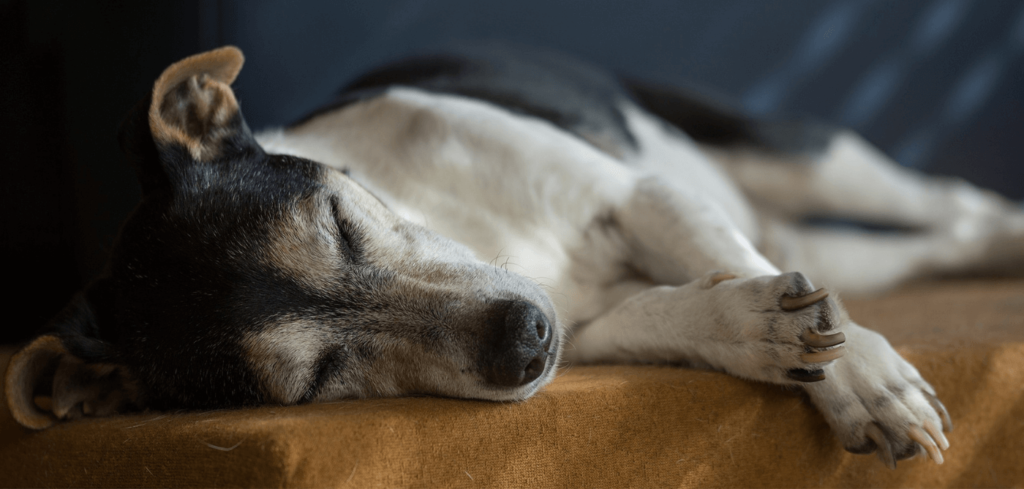
As our dogs grow older, it’s only natural to worry about their health…
After all, even minor injuries can lead to bigger issues when you have a senior dog…
But what if your old dog has a hernia? Is it a minor problem or is it something that can become a life-threatening issue for a senior dog?
Well, a lot of people actually have those same types of questions, and in this article, we’re going to answer them by going over the following information…
- My Old Dog Has A Hernia – What Do I Need To Do?
- What Is A Dog Hernia?
- How Do Dogs Get Hernias?
- Types Of Dog Hernias
- Can A Dog Live With A Hernia?
- Symptoms Of Dog Hernias
- Old Dog Hernia Treatment
- How To Prevent Dog Hernias In The Future
In the end, you’ll know what to expect if your older dog has a hernia, and you’ll know exactly what you need to do to help out your four-legged friend…
My Old Dog Has A Hernia – What Do I Need To Do?
Older dogs are more susceptible to certain forms of hernias such as inguinal and perineal. Sometimes these hernias can be treated without surgical intervention and sometimes surgery is required…
If you suspect your senior dog has a hernia, early treatment is important to limiting its effect on your dog’s overall health. Because of that, you should contact a vet immediately…
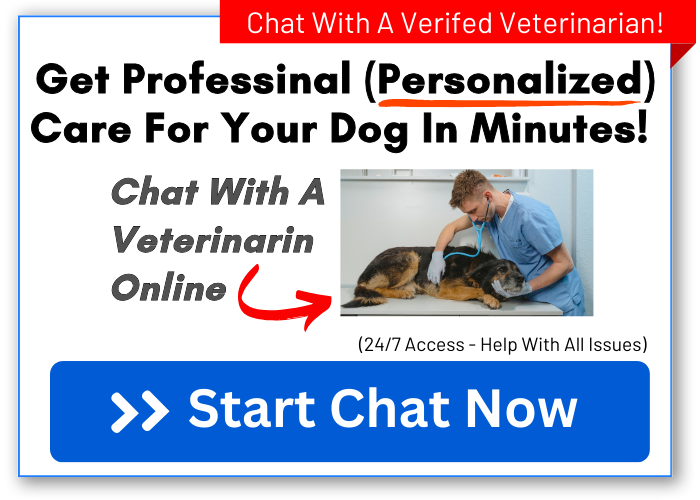
What Is A Dog Hernia?
A hernia is the protrusion of internal organs and tissue in a dog’s abdomen through the muscle wall. It looks like a swollen bump and usually appears on the abdomen near the belly button.
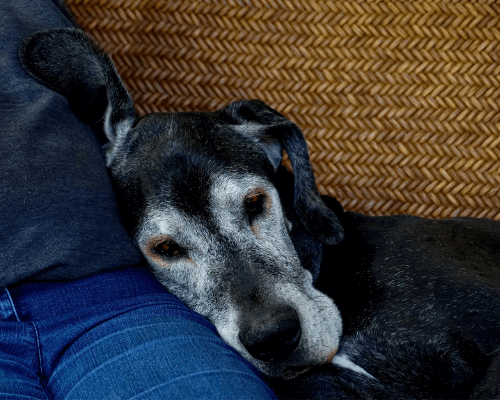
That being said, hernias can appear in other parts of the groin or in the area near a dog’s hind legs as well.
How Do Dogs Get Hernias?
There are many things the can cause hernias in dogs. Some hernias are congenital, which means that the dog had a hernia (or conditions for it) when he or she was born.
Other types of dog hernias can be caused during pregnancy (if your dog is female) or because of an injury that your dog sustained.
There are several other potential causes as well:
Chronic Constipation…
Straining due to constipation puts a load on your dog’s pelvic tissues and muscles. Over time, muscles can get worn out and a part of the abdomen can protrude into the pelvis near the anus.
Gender…
Older male dogs are more susceptible to perineal hernias, which are described below, and female dogs can get inguinal hernias during pregnancy or large abdominal hernias after labor.
Not Neutering Or Spaying Your Dog…
Neutering or spaying your dog can help prevent certain types of hernias. It’s also a good idea to keep dogs with congenital hernias from breeding.
External Trauma…
A tough blow to the abdomen, a dog bite, or some other form of trauma can trigger a hernia. In fact, the impact of getting hit by a car has been known to cause hernias in dogs.
Types Of Dog Hernias…
Dog Hernias can come in a lot of different forms, and some of the forms are more likely to happen in old dogs rather than young dogs or puppies.
The most common types of hernias found in dogs include the following:
Diaphragmatic…
When a dog’s diaphragm is weak, the contents of his or her abdomen can bulge into the chest cavity. This can lead to respiratory problems, which can be life-threatening in serious cases.
Diaphragmatic hernias are usually caused as a result of traumatic injury, but they can also be congenital.
Hiatal…
With hiatal hernias, the bulging happens at the “hiatus” opening where your dog’s esophagus meets his stomach.
They can also be caused by traumatic injuries or be the result of a congenital issue.
Umbilical…
Umbilical hernias occur on a dog’s belly button, and they’re caused because partial closure of the umbilical ring can leave a little bit of space where the protrusion occurs.
Umbilical hernias are found in puppies, and they’re more visible when the puppy is straining.
Sometimes, vets are able to fix these types of hernias when your puppy is spayed or neutered, and other times, they may resolve on their own.
Inguinal…
Inguinal hernias appear near the groin of the dog, just around where their hind legs connect to the rest of their body.
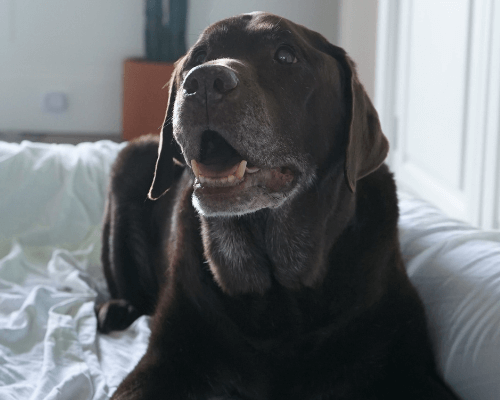
This type of hernia can be caused by trauma, but it’s also a common form found in dogs who are pregnant.
Large inguinal hernias have the potential to trap your dog’s uterus or bladder, which is an extremely dangerous situation.
Perineal…
Perineal hernias happen when the organs in the abdomen push through a weak spot in the pelvic muscle.
They can also be caused by trauma, and you’ll often see this type of hernia in adult or old male dogs who have not been neutered.
Which Types Of Hernias Are Found In Old Dogs?
Each one of these hernia types has its own signs and causes, but as I mentioned before some are more likely in senior dogs and some are more likely in puppies.
For example, umbilical hernias are unlikely to be an issue for old dogs because they would either be fixed early or resolved on their own when the dog was still a puppy.
On the other hand, diaphragmatic, hiatal, inguinal, and perineal hernias can all be caused as a result of injury and may be found in older dogs.
Can A Dog Live With A Hernia?
A canine hernia is usually uncomplicated and low-risk. However, on some occasions, the hernia can progress and cause other serious medical issues.
Some of those issues include the following…
Blockage…
Old male dogs with perineal hernias are more susceptible to intestinal blockage, which can be life-threatening.
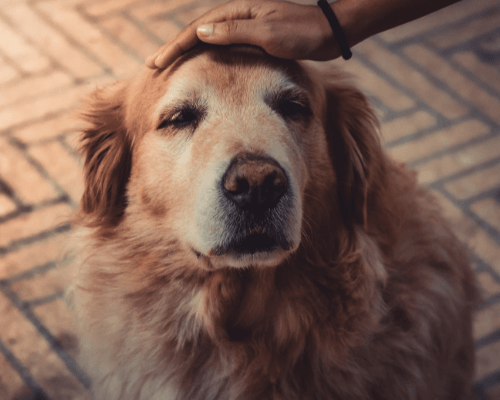
On top of that, in some cases of inguinal hernias, internal organs (such as the bladder or uterus) can get trapped in the hernia.
This is a serious potential issue that requires immediate surgical intervention.
Sagging…
Abdominal hernias can be extremely troublesome once they grow large enough to touch the ground.
This puts an extra load on the dog’s muscles and the friction can irritate the skin. This problem is particularly common with old female dogs who were pregnant more than once.
Hernia Emergency…
There are some cases in which a dog hernia can lead to death…
For example, a diaphragmatic hernia caused by an injury can lead to respiratory problems and may require immediate medical attention.
Symptoms Of Dog Hernias…
If you notice a new bulge or bump on your dog’s belly or in his or her pelvic area, your dog might have a hernia…
Other signs that might indicate your dog has a hernia include:
- Excessive Drooling
- Lethargy
- Skin irritation
- Loss of appetite
- Vomiting (high fluid volume)
- Irregular breathing or difficulty breathing
- Swelling near the hernia area
If you notice any of these signs and symptoms, you should contact a vet immediately for guidance…

Old Dog Hernia Treatment…
Once at the vet, many dog hernias are diagnosed with a simple physical examination.
Other types might not be as obvious though, and in these circumstances, vets rely on X-rays for diagnosis. A contrast dye can be used to enhance visibility on the X-ray.
Managing Reducible Hernias In Dogs…
Depending on the severity, hernias are classified into reducible and non-reducible cases. Reducible hernias can be pushed back into place without surgical interventions.
In addition to that, the vet might prescribe medications to help your dog recover. For instance, with hiatal hernias, oral antacids can reduce vomiting, and antibiotics are often used for cases with pneumonia complications.
The good news is that many dog hernia cases are reducible. Just keep in mind that early diagnosis is key.
Dog Hernia Surgery…
If a hernia is non-reducible, surgery might be necessary. If that’s the case, the vet will use a muscle flap procedure to keep the organs in place, and your dog will need some time to recover afterward.
Some of the things which will help an older dog with a hernia make a speedy recovery include:
- Giving your dog smaller, more frequent meals.
- Giving your dog his (or her) medication routinely (not missing it!).
- Restriciting your dog’s activity level, while he or she is recovering.
How To Prevent Dog Hernias In The Future…
Sometimes dog hernias are unavoidable, but that being said, there are things you can do to lower the chances that your dog has a hernia in the future.
For example, if your dog hasn’t been neutered or spayed yet, ask your vet if it’s a good idea to get it done now.
You should also, make sure your dog has a nutritious diet that is appropriate for a senior dog and appropriate for your dog’s breed (I recommend this dog food).
You should also consider obedience training, especially if your dog is prone to injuries because teaching your dog how to obey can go a long way at keeping him or her safe…
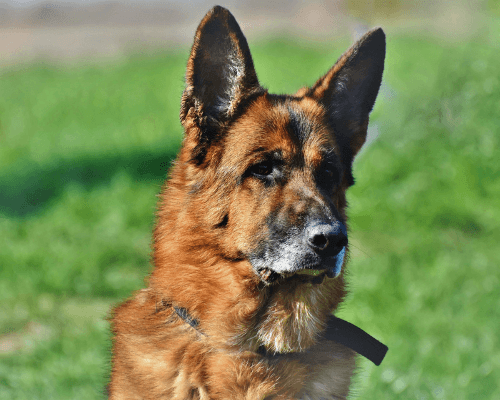
Now if you need help properly training your dog, there are a number of fantastic training programs out there, but the one I recommend is called Brain Training For Dogs…
I like it because it’s very easy to follow, it gets results quickly, and you can access the program from the comfort of your own home…
The reason why it works so quickly and effectively is because it teaches you how to simply redirect the natural intelligence that your dog already has…
If you’d like to learn more about how Brain Training For Dogs can help you teach your dog to be more obedient, click the link below…
>> Click Here To Learn How Brain Training For Dogs Can Help You!

Final Thoughts…
It’s tough when our fur babies get older, and it’s even tougher when they have medical issues like hernias…
So if you’re dealing with an old dog with a hernia, remember that a good veterinarian should be able to give your dog the care that he or she needs.
Just remember to try and identify the hernia quickly, and get your dog the necessary help as soon as possible…
…because the earlier the vet can diagnose the hernia, the less impact it will have on your dog’s health.